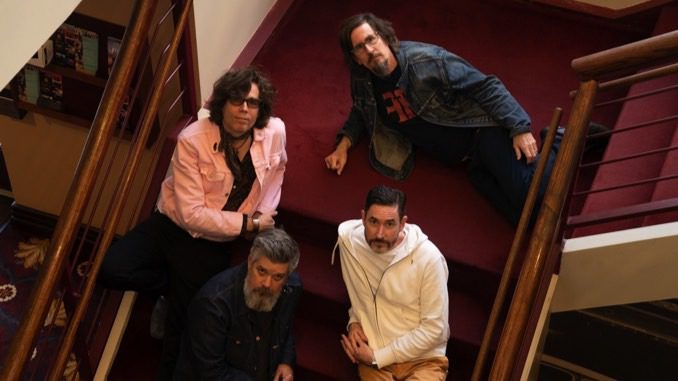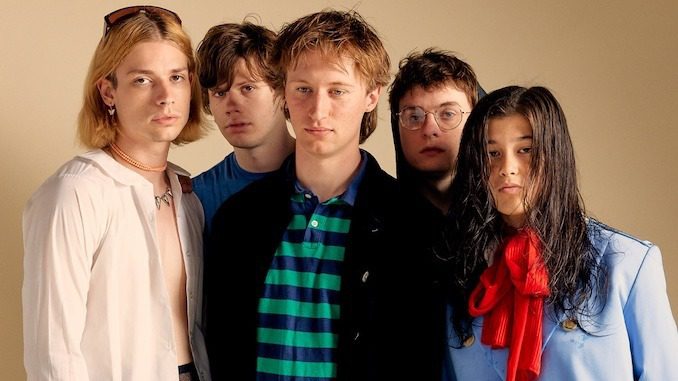Many of us were fortunate enough to spend the largely stagnant times during the pandemic lockdowns plowing through every last movie available on whatever streaming services we had access to. But for musician, author, long-distance runner and newly christened mythic-level Magic: The Gathering Arena player John Darnielle, there was simply no time to log hours glued to the screen. Over the past three years or so, he and his long-running indie-rock band The Mountain Goats kept up their typically prolific pace, recording two albums, one at the legendary Sam Phillips Recording Studio in Memphis—2020’s Getting Into Knives—and the other at the equally renowned FAME Studios in Muscle Shoals—last year’s Dark In Here. While making those records, he also found the time to work outside of the band, both on a solo “boombox” record, Songs for Pierre Chuvin, that harkened back to the Mountain Goats’ early tapes, and his most ambitious novel, this year’s Devil House.
But when Darnielle found himself with some free time amid all of his artistic pursuits for some solitary movie viewings, away from his wife and two boys in their home in Durham, he decided to start watching the most gruesome action movies he could find. It started as a way to “check out at the end of the day,” he recalls. But knowing how relentlessly active his mind is, perhaps it was to be expected that these flicks would ignite his creativity and inspire the new batch of songs on the latest Mountain Goats album, Bleed Out. Much like a gushing wound, the ideas kept flowing for Darnielle the more he watched.
“I started watching action movies, and the same thing happened that used to happen when I was in college writing early Mountain Goats tapes,” says Darnielle over a mid-morning Zoom call. “I can’t really watch a movie at home without getting some ideas about the action onscreen or getting inspired by things people say, or locales. With all sorts of details in any given frame, I can take off and make a whole song out of [one]. So I started writing a song in the middle of the first movie I watched. I hit pause and wrote a verse and a chorus, then put it aside and watch[ed] the rest of the movie. That’s my old process. That’s what I used to do for years. So I just kept watching movies where guys kick each other’s asses and shoot each other and throw each other off bridges and stuff, and started writing songs with these sorts of scenes in them. I had two or three songs and I was like, ‘Well, if you have three songs like that, you might have to go ahead and add a whole album of it,’ and that’s where I landed.”
The first film that inspired these songs to start flowing was 2016’s Blood Father, starring Mel Gibson. Darnielle had been a fan of the director Jean-François Richet’s Vincent Cassel-starring Mesrine films, but couldn’t help but be taken by the fists-in-the-air spectacle of this overlooked work. “It’s not as good as Mesrine, don’t get me wrong,” he says with a laugh. “But it’s my favorite little movie that[‘s] just much better than it has any right to be. The script, it’s got a lot of the lazy things American movies do now where it doesn’t trust you to take any point that it hasn’t flashed for you across a big [screen]. Gibson, I gather he’s a piece of work. Pretty great action movie actor, though!” While Darnielle had urges to engage his inner film buff, the task of scrolling through the Criterion Channel to land on a three-and-a-half-hour arthouse masterpiece could be grating after long days of working and being present with his family. For Darnielle, these rough-’em-up action flicks provided him the right amount of energized brain activity that would not only keep him awake, but also inspire him to create, rather than to ponder.
“Over the age of 30, Bergman is not a happening thing after 8 p.m.,” Darnielle laughs. “You need your awakened brain to do this. I love Bergman. I’ve seen probably more Bergman movies than almost anybody else’s movies. I was raised on all the classics of arthouse cinema, Fellini, Bergman, Antonioni, all those guys. But I think, especially those movies, were made in a time when thinking about weighty materials felt a little more opt-in than it does now. I mean, now we’re all on social media all day and we’re being confronted with the horrors of the waking world all day long. So there’s some value in a much more fictionalized and stylized version of our violent world.”
This is exactly the heightened, John Woo, white doves flying above heavy pistol fire world that he creates on Bleed Out. There are “Guys on Every Corner” and grizzled characters dead-set on bringing on suffering to those who wronged them in the past. The band’s instrumentation matches Darnielle’s hardened narratives, making Bleed Out the most aggressive-sounding Mountain Goats record since 2011’s All Eternals Deck. Songs like fist-pumping opener “Training Montage” and the punk assault of “Wage Wars Get Rich Die Handsome” make use of the band’s drummer John Wurster in ways that he usually showcases in his other gigs playing with Merge labelmates Superchunk and Bob Mould. This direction—which is noticeably different from the lush feel of the band’s recent releases—can be credited to Bully’s Alicia Bognanno, who produced the album, as well as playing guitar and keys, and singing backups. Darnielle’s manager had proposed the idea of working with Bognanno and after meeting with her at his house in Durham, they decided she was the right person for the job.
“She makes indie rock that, for those of us who liked ‘90s indie rock, it touches all the buttons. It’s not retro. But it totally has that very spontaneous, magic energy,” he says of Bognanno.“All of her stuff, even though I’m sure it’s really labored over, it feels very in the moment. That’s the trick that Mountain Goats records always try to also hit. To make it feel like it just sort of happened. So we related on that a little bit.”
Bognanno brought a certain amount of new energy to the group, much like a new cyber-hacking expert joining a crew of veteran bank robbers. Most of the melodic leads you hear throughout Bleed Out are hers or ones that she worked out with multi-instrumentalist Matt Douglas. It was a welcome addition to which Darnielle credits the exciting overall feel of the record. “It was having a fifth in the studio. It was unfamiliar and we just knew that the excitement of playing with new friends is always great. There’s some real basic stuff about [how] when you bring somebody in who’s good and has their own ideas, then you shape your own practice around what they bring to the table and something new happens,” he explains. “ She’s real fun. Her playing style has a looseness to it. It’s really fantastic and she’s got a great ear.”
When getting one’s own ears on Bleed Out, it’s very easy to read into the lyrics Darnielle wrote and take away larger thematic ideas about the concept of revenge being this blinding sense of purpose that makes you neglect human emotions like love and fear of death. But as he views it now, he simply wanted to create a world where these hard-boiled characters could live, breathe and saw the barrels off their shotguns. The themes would reveal themselves later, he figured, after all of the blood got washed from the streets into the sewer.
After all, if you think about it, on some level Michael Mann probably wanted to see [spoiler warning!] Neil McCauley even the score with Waingro at the end of his opus Heat as a badass moment of retribution, regardless of the profound figurative rubicon Robert De Niro’s character had to cross in the process. Darnielle had a similar intent when he began writing, as most writers do. The story always comes first, then you dig through the bones once it’s recorded.
“Revenge, in any singular pursuit, is going to narrow your field of vision,” he explains. For example, in Bleed Out’s “Hostages,” the narrator details his negotiations with the tactical team waiting to snipe him from their perches if he steps outside of the building he’s occupying. The only thing keeping him safe is the never-ending number of bound and gagged people he’s holding captive inside: “We may run out of bullets / We’re never going to run out of hostages,” he declares. Later, the character goes further into explaining how one-track-minded they are the more the situation gets out of hand. “If there’s one thing I love, it’s an infinite resource / If there’s one thing worth loving, it’s a surplus of supplies,” he sings. One reading of this could be that the character Darnielle has created is so dug into his situation that the people he’s taken hostage are no longer people in his eyes, just bargaining chips. But according to Darnielle, creating this standoff was all in bloody fun.
“There’s a sense in which any piece of writing can’t help but be about writing that writers can’t help,” Darnielle explains. “To say that when somebody says that they have a ‘surplus of supplies,’ and those supplies are hostages. Well, one thing you’re saying is that, in the song, I could kill as many people as I want, because I’m the guy inventing the people, right? This is part of what de Sade does in the last part of The 120 Days Of Sodom as he starts having these things that are physically impossible. They can’t take place. They don’t exist. He’s got thousands of people being killed and there’s no limit. There is no limit because they don’t exist, but they do exist in the story. They exist for you and me, if I make them real enough.”
“And that’s the glory of fiction—if fiction is broadly considered as movies, songs, whatever—is that there’s an absolute surplus of the supplies of bodies you need, of the blood you need to flow, of the gore in which you need to wade knee-deep, hip-deep, neck-deep,” he continues. “There’s a surplus that is utterly glorious, insofar as then you can get to that point of utterly engaging something, with no consequence beyond whatever it does to your innards. When you think about those things, that’s the part that’s actually worth considering. If you watch too many Park Chan-wook movies, then you don’t round out your diet. It can mess you up. Same with the Japanese director Takashi Miike. Great director. A visionary. But if you drown yourself in too much Miike, it will literally affect the way you’re looking at the world. That’s the interesting stuff, but from a writing standpoint, it’s just glorious, right through the pure space of writing or the pure space of reading, which are two sides of a mirror. It’s absolutely glorious that you can have all you want of a given quantity, right? And that is, I think, some of what’s going in ‘Hostages,’ is that it is immersing oneself in the infinite possibility for whatever the Infinity before you is.”
Another easily gleaned theme one can take from this subject matter is the similarities in the camaraderie found in both playing in a band and being in a crew of criminals. Darnielle is aware of this common trope in songwriting. It was there in songs like “The Boys are Back In Town” by Thin Lizzy and, in his favorite example, the pirate/touring musician metaphor “The Hook” from Stephen Malkmus’ first solo album. It’s a song I was unfamiliar with at the time, and given Darnielle’s excitement in sharing his love for the song, he read its lyrics dramatically over Zoom. After delivering each swashbuckling line, Darnielle stopped and asked, “What’s he talking about? He’s talking about joining a band. It’s absolutely a transparent metaphor. But I would’ve 100% believed if he were to say, ‘No, I’m not talking about that at all. I was just telling a pirate story.’ You’d 100% believe that, right?”
Darnielle seems a bit puzzled to find that the lyric website he was reading from credited a different songwriter for the tune. “He didn’t write that? Oh my God. Are you kidding?” he says. “It says it’s by ‘John Popper.’ That can’t be true.” I explain to him that John Popper is the lead singer of Blues Traveler and that they also have a very popular song called “Hook,” a song that certainly does not use the same metaphor. Our laughter comes close to derailing the entire interview in the most gloriously unhinged fashion. “This is an error of the algorithm,” Darnielle says as we both try to compose ourselves. “If it turned out to be a Blues Traveler song, it would be a moment of moral crisis for me!”
Once we’ve moved past it, Darnielle further illustrates the point he was making with Malkmus’ song, all Poppers aside. “That one is very explicit about it. But I think whenever a writer who is in a band is writing about a group of people, then there are two groups of people that will probably be talking about one way or the other, his family and his band,” he says. “I think both readings are going to bear some fruit. But you can do the same reading that it’s my band [as] the family that I have built. There’s always a sense when you’re raising children and trying to get them through the world that we have friends and co-conspirators, but at the same time, it’s us against the fates. All that stuff works for a few readings that you could do. You can do it with social groups, also, in these lyrics. But there’s something to be said for the notion that the first-person plural on an album about a bunch of killers is going to be the band.”
Pat King is a Philadelphia-based journalist and host of the In Conversation podcast at Ears to Feed. He releases his own music with his project Labrador and is a tireless show-goer and rock doc fanatic. He recently took up long-distance running, which he will not shut up about. You can follow him at @MrPatKing.
Watch a 2009 Mountain Goats performance from the Paste archives below.




